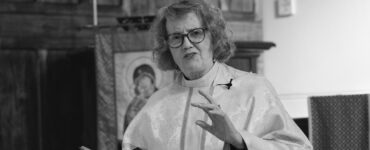The first week of the academic teaching year at the University of Divinity has coincided with the beginning of the Christian season of Lent. This happens every few years, but in 2020 is all the more notable in this time of crisis as we are shaken out of our usual patterns of life by the climate emergency and the spread of the coronavirus.
This week, the celebration of Ash Wednesday has emphasised human frailty and the mortality of all creation, while the beginning of semester has been imbued with the anticipation of discovering new knowledges and skills and the emergence of deep anxieties.
It should come as no surprise that the start of a new year in higher education shares much in common with Lent. Lent is the season of preparation for Easter, when baptismal promises are made or renewed. This requires preparation and education, for a promise can’t be kept if it’s not supported by some understanding of what the promise requires.
The beginning of Lent and the beginning of semester hold in common the hope of self-improvement and self-realisation. In Christian theology, this means the hope of growing into fullness of life, the vision that God has for each of us: being all we’re meant to be.
But, like the Lenten discipline of giving something up, education requires sacrifice. Students give up the precious gift of time, time that could be used for work, leisure or being with friends and family.
Education, like the best Lenten disciplines, also means taking on something new. In this case, it’s opening and applying both mind and body to new and unfamiliar knowledges, ways of thinking, and skills.
Perhaps the deepest connection between Lent and the beginning of semester is the challenge of judgment. The first question most students ask in a subject is “how will I be assessed?” or “what do I need to do to pass?”. Assessment is, for the student, an act of submitting oneself to the judgment of others. The student is forced to recognise the limits of their knowledge and to seek to understand the unknown. Meanwhile the teacher or examiner must judge the work fairly, honouring the student’s work while upholding the standards of the discipline or profession in which the subject is located.
Exercising judgment and submitting to the judgment of others is hard. It requires humility and respect, honesty and courage. It is a lifelong practice. In the academic world this is enshrined in the practice of peer-review where new discoveries are submitted to the scrutiny of experts to test and refine them.
So as this semester begins, my hope is that each of us will find the courage and humility to prepare ourselves for the season ahead – to be open to new ideas and practices, to submit ourselves to the judgment of others, and to discover new ways to serve the emerging, critical needs of the world in which we live.

Emeritus Professor Peter Sherlock was the Foundation Vice-Chancellor of the University of Divinity from 2012-2024. He is a cultural and religious historian of Renaissance and Reformation Europe and an expert on governance and leadership in educational and church settings. A graduate of the University of Melbourne and the University of Oxford, his academic career has included an ARC Postdoctoral Fellowship in History at the University of Melbourne and four years as Dean of the United Faculty of Theology, Melbourne.







Add comment